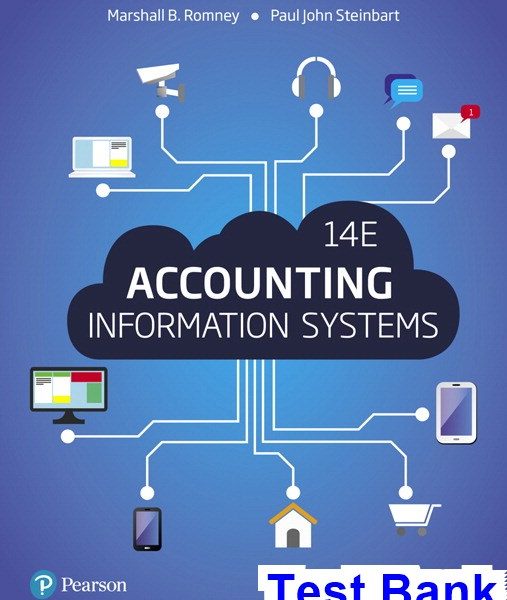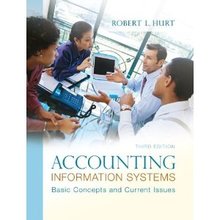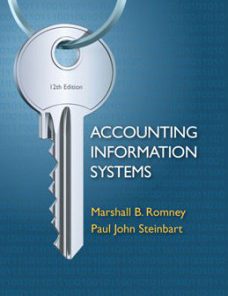Accounting Information Systems 14th Edition Romney Test Bank
$35.00 Original price was: $35.00.$26.50Current price is: $26.50.
Accounting Information Systems 14th Edition Romney Test Bank
Accounting Information Systems 14th Edition Romney Test Bank

Product details:
- ISBN-10 : 0134474023
- ISBN-13 : 978-0134474021
- Author: Marshall B. Romney
Accounting Information Systems, 14th Edition covers all of the most recent updates in AIS, including how developments in IT affect business processes and controls, the effect of recent regulatory developments on the design and operation of accounting systems, and how accountants can use the AIS to add value to an organization. Not only will readers see how AIS has changed the role of an accountant, but they’ll also be prepared for a successful accounting career in public practice, industry, or government.
Table contents:
Chapter 1 Accounting Information Systems and the Accountant 1
1.1 Introduction: Why Study Accounting Information Systems? 1
1.2 Careers in Accounting Information Systems 2
Traditional Accounting Career Opportunities 2
Systems Consulting 2
Fraud Examiner or Forensic Accountant 3
Information Technology Auditing and Security 4
Predictive Analytics 5
1.3 Accounting and IT 6
Financial Accounting 6
Managerial Accounting 9
Auditing 12
Taxation 14
1.4 What are Accounting Information Systems? 14
Accounting Information Systems 14
The Role of Accounting Information Systems in Organizations 18
1.5 What’s New in Accounting Information Systems? 19
Cloud Computing—Impact for Accountants 19
Corporate Responsibility Reporting 20
Suspicious Activity Reporting 21
Forensic Accounting, Governmental Accountants, and Terrorism 22
Corporate Scandals and Accounting 22
Chapter 2 Accounting on the Internet 32
2.1 Introduction 32
2.2 The Internet and World Wide Web 33
Internet Addresses and Software 33
Intranets and Extranets 34
The World Wide Web, HTML, and IDEA 35
Groupware, Electronic Conferencing, and Blogs 35
Social Media and its Value to Accountants 36
2.3 XBRL—Financial Reporting on the Internet 37
XBRL Instance Documents and Taxonomies 38
The Benefits and Drawbacks of XBRL 38
The Current Status of XBRL 40
2.4 Electronic Business 41
e-Accounting 41
Retail Sales 42
E-Payments, E-Wallets, and Virtual Currencies 43
B2C, B2B, and C2C E-Commerce 46
Electronic Data Interchange 47
Cloud Computing 48
2.5 Privacy and Security on the Internet 51
Identity Theft and Privacy 51
Security 53
Spam, Phishing, Spoofing, and Ransomware 53
Firewalls, Intrusion Detection Systems, Value-Added Networks, and Proxy Servers 54
Data Encryption 57
Digital Signatures and Digital Time Stamping 58
Chapter 3 Information Technology and AISs 69
3.1 Introduction 69
3.2 The Importance of Information Technology to Accountants 70
Six Reasons 70
The Top 10 Information Technologies 71
3.3 Input, Processing, and Output Devices 72
Input Devices 72
Central Processing Units 78
Output Devices 80
3.4 Secondary Storage Devices 81
Magnetic (Hard) Disks 82
CD-ROMs, DVDs, and Blu-Ray Discs 83
Flash Memory 84
Image Processing and Record Management Systems 84
3.5 Data Communications and Networks 85
Communication Channels and Protocols 85
Local and Wide Area Networks 86
Client/Server Computing 89
Wireless Data Communications 90
Cloud Computing 93
3.6 Computer Software 93
Operating Systems 93
Application Software 94
Programming Languages 95
Chapter 4 Accounting and Data Analytics 109
4.1 Introduction 109
4.2 Big Data 110
Volume 110
Velocity 110
Variety 111
Veracity 112
4.3 Analyzing Data 112
Data Procurement 113
Data Provisioning 115
Data Analysis 116
Presentation 117
4.4 Enabling Technologies and Tools 118
Data Access 118
Analysis and Data Visualization Tools 121
4.5 Data Analytics and the Accounting Profession 123
Tax Accounting 123
Managerial Accounting 124
Assurance and Compliance 125
Chapter 5 Integrated Accounting and Enterprise Software 134
5.1 Introduction 134
5.2 Integrated Accounting Software 135
Small Business Accounting Software 136
Mid-Range and Large-Scale Accounting Software 138
Specialized Accounting Information Systems 138
5.3 Enterprise-Wide Information Systems 139
Enterprise System Functionality 140
The Architecture of Enterprise Systems 142
Business Processes and ERP Systems 145
Benefits and Risks of Enterprise Systems 145
5.4 Selecting a Software Package 149
When is a New AIS Needed? 149
Selecting the Right Software 149
Chapter 6 Introduction to Internal Control Systems and Risk Management 163
6.1 Introduction 163
Definition of Internal Control 164
Internal Control Systems 165
6.2 COSO Internal Control—Integrated Framework 165
2013 COSO Report 165
6.3 Enterprise Risk Management 169
COSO ERM Introduction 169
2004 ERM Framework 169
2017 ERM Framework 171
Risk Governance and Culture 172
Risk, Strategy, and Objective Setting 173
Risk in Execution 174
Risk Information, Communication, and Reporting 174
Monitoring Enterprise Risk Management Performance 175
6.4 Examples of Control Activities 175
Good Audit Trail 175
Sound Personnel Policies and Procedures 175
Separation of Duties 177
Physical Protection of Assets 179
6.5 Monitoring Internal Control Systems 183
Reviews of Operating Performance 183
COSO Guidance on Monitoring 183
Operating Performance vs. Monitoring 183
COBIT 5 184
6.6 Types of Controls 186
Preventive Controls 186
Detective Controls 187
Corrective Controls 187
Discerning Between Preventive, Detective, and Corrective Controls 187
6.7 Evaluating Controls 188
Requirements of the Sarbanes–Oxley Act 188
Cost–Benefit Analysis 188
A Risk Matrix 190
People also search:
core concepts of accounting information systems 14th edition pdf
solution manual accounting information systems 14th edition romney
accounting information systems 14th edition chapter 3 solutions
accounting information systems chapter 14 solutions
accounting information systems chapter 4 quizlet












